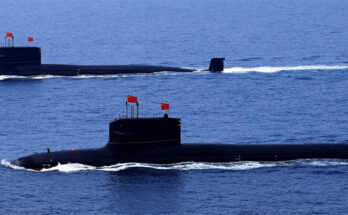
When Germans went to the polls on Sunday, February 23, three main issues appeared to be weighing on the public: high energy costs, a lagging economy, and immigration.
Further on the periphery loomed another matter altogether: the crisis in trans-Atlantic relations stemming from comments by U.S. President Donald Trump on a host of things, ranging from Ukraine and a potential peace deal to sowing doubts about whether the U.S. would stand with its NATO allies against Russia in the event of conflict.
Yet with Germany’s new chancellor-in-waiting in Friedrich Merz, leader of the center-right CDU/CSU political bloc, questioning the future of the NATO Alliance and emphasizing the need for European unity to “achieve independence from the USA”, the time for a vigorous German security policy approach may have finally arrived.
Accompanying that approach will, by necessity, be an emphasis on the hard power Germany has been so reluctant to invest in since the country’s reunification in 1990.
But while Merz has spoken bluntly in a language one imagines he feels the Trump administration will understand, he is playing with a weak hand.
Germany’s Bundeswehr is still in the early stages of building itself up to a moderately sufficient level of capability following decades of force downsizings and budgetary diets that left the force denuded of critical enablers.
Though Merz’s predecessor, outgoing Chancellor Olaf Scholz, announced a “Zeitenwende,” or turning point, to the Bundestag on February 27, 2022, days after Russia invaded Ukraine, noting that a massive shift in defense policy approach would be undertaken, little has come from this.
At the time of his comments, Scholz vowed to bring the German defense budget up to, and above, the NATO minimum requirement of 2 percent of national GDP. But any calculation that puts Germany’s defense budget up at 2 percent of GDP does so only by including the country’s EUR100 billion ($113 billion) special defense fund – the Sondervermögen – used to finance major defense procurements and restock munitions, missiles and ordnance.
Additionally, the special fund is time-limited (outgoing Defense Minister Boris Pistorius has stated that the special fund will be fully contracted for by year-end 2025 and all expenditure exhausted by 2027) and comes with attachments (the money is loaned to the Defense Ministry by the Ministry of Finance at a five percent lenders rate, which coupled with inflation has reduced the actual purchasing power of the fund).
For 2024, the German defense budget amounted to €51.8 billion ($56 billion), or just around, or slightly above, 1.2 percent of GDP. With the special fund added – as Germany provided to NATO for its 2024 estimates – that total jumps another €20 billion, and with military aid to Ukraine factored it jumps again to €90.6 billion for 2024. That figure – with all the one-off budgetary machinations included – enabled the German defense budget to slightly eclipse the NATO minimum standard and reach 2.1 percent of GDP.
But to bring the annual topline up to that level will require a new government willingness to fully prioritize defense, and most importantly changes to the country’s constitutional debt brake (Schuldenbremse). Most importantly, this will depend upon economic growth to underpin greater spending.
Furthermore, despite whatever governing coalition he can muster – most likely a grand coalition with the other mainstream party, Scholz’s leftist Social Democratic Party (SPD) – Merz will still have two big winners from Sunday’s election, the far-right AFD and far-left Die Linke (The Left), both opposing him on continuing to arm Ukraine.
The two parties differ on easing the debt brake, something Merz is interested in reforming to enable greater investment in public infrastructure and defense. While the AFD supports strengthening the Bundeswehr, it is opposed to loosening the debt brake, which limits annual borrowing by the federal government to 0.35 percent of GDP. Die Linke, on the other hand, is open to reforming the debt brake for higher spending on infrastructure but firmly opposed to shifting extra funding towards the Bundeswehr.
This puts the next government in a bind, particularly at a time the German economy has failed to grow over five years.
Military investment is already far down the list of German voters’ priorities, regardless of concerns about the U.S. withdrawing its 35,000 forces from German soil or Trump’s administration voicing the belief that it is time for Europeans to look after Europe while Washington shifts its focus to the Asia-Pacific.
Further, over 30 percent of German voters backed pro-Russia parties in Sunday’s election – hardly a mandate for continuing to support Ukraine with military aid and to invest in backfilling equipment donated to Kiev.
Ultimately, the numbers required for Berlin to reach and maintain the NATO minimum investment threshold are eye-watering – roughly €25-30 billion ($26-31 billion) in additional spending every year – and likely to generate pushback from a public that spent decades convinced war was an outdated concept and of no existential threat to Germany.
During the Cold War, the former West Germany invested roughly 3 percent of GDP towards defense.
Today, just bringing the annual defense budget up to a firm 2 percent of GDP – not a flimsy 2 percent manufactured by one-off spending envelopes and tenuous accounting – will require extremely deft political consensus building in a country where militarization is an anathema to the voting public. And even a baseline 2 percent figure would still fall well below the 5 percent of GDP threshold Donal Trump has stated should be the new standard for NATO members (notwithstanding the fact that he U.S. itself does not meet that level of investment).
So, while pundits note the revolutionary rhetoric emanating from Friedrich Merz in the hours after the German election, it should be remembered that talking and doing remain very different things.
European politicians have often proven quite adept at the former, while falling short on the latter. It’s quite easy for leaders like Merz to voice dismay at Trump – or Washington at large – for declaring that the U.S. is no longer willing to underwrite Europe’s security and to announce a goal of achieving “true independence from the U.S.”
But finding the political willpower to decouple Berlin from dependency on the American security umbrella will come at a steep price.
Just how many tradeoffs in the ever-acrimonious guns-versus-butter debate that Berlin’s politicians and German voters can accept promises to be worthwhile viewing over the coming year(s).
Dan Darling is Forecast International’s director of military and defense markets. In this role, Dan oversees a team of analysts tasked with covering everything from budgeting to weapons systems to defense electronics and military aerospace. Additionally, for over 17 years Dan has, at various times, authored the International Military Markets reports for Europe, Eurasia, the Middle East and the Asia-Pacific region.
Dan's work has been cited in Defense News, Real Clear Defense, Asian Military Review, Al Jazeera, and Financial Express, among others, and he has also contributed commentary to The Diplomat, The National Interest and World Politics Review. He has been quoted in Arabian Business, the Financial Times, Flight International, The New York Times, Bloomberg and National Defense Magazine.
In addition, Dan has made guest appearances on the online radio show Midrats and on The Media Line, as well as The Red Line Podcast, plus media appearances on France 24 and World Is One News (WION).




